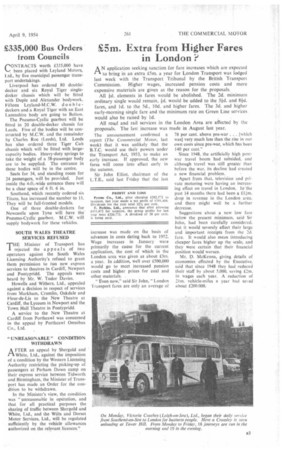£5m. Extra from Higher Fares in London ?
Page 37

If you've noticed an error in this article please click here to report it so we can fix it.
N application seeking sanction for fare increases which are expected to bring in an extra £5 in. a year for London Transport was lodged last week with the Transport Tribunal by the British Transport Commission. Higher wages, increased pension costs and more expensive materials are given as the reason for the proposals. All id. elements in fares would be abolished. The 2d. minimum ordinary single would remain, id. would be added to the 31d. and &id. fares, and Id. to the 5d., 10d. and higher fares. The 3d. and higher early-morning single fare and the minimum rate on Green Line services would also be raised by Id.
All roa,d and rail services in the London Area are affected by the proposals. The last increase was made in August last year.
The announcement confirmed a report (The Commercial Motor, last week) that it was unlikely that the B.T.C. would use their powers under the Transport Act, 1953, to make an early increase. If approved, the new fares will come into effect early in the autumn.
Sir John Elliot, chairman of the L.T.E., said last Friday that the last increase was made on the basis of advances in costs dating back to 1952. Wage increases in January were primarily the cause for the current application, the cost of which in the London area was given as about £3m. a year. In addition, well over £500,000 would go to meet increased pension costs and higher prices for coal and other materials. .
"Even now," said Sir John, " London Transport fares are only an average of
78 per cent, above pre-war . [which was] very much leas than the rise in our own costs since pre-war, which has been 140 per cent."
Since 1948, the artificially high postwar travel boom had subsided, and although travel was still greater than before the war, its decline had created a new financial problem.
Apart from that, television and private motoring were having an increasing effect on travel in London. In'the past 14 months there had been a Dim. drop in revenue in the London area, and there might well be a further decrease.
Suggestions about a new low fare below the present minimum, said Sir John, had been carefully considered, but it would severely affect their large and important receipts from the 2d. fare. It would also mean introducing cheaper fares higher up the scale, and they were certain that their financial position would worsen.
Mr. D. McKenna, giving details of economies effected by the Executive. said that since 1948 they had reduced their staff by about 5.000, saving £2m. in wages each year. A reduction of 21m. vehicle-miles a year had saved about £200.000.




































































































